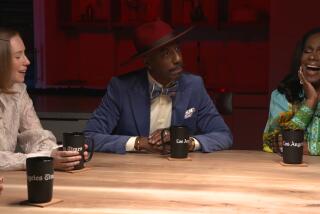‘Ellen’ Takes Back Seat at Talk on Gays’ Role in Hollywood
- Share via
While the media and much of Hollywood anxiously await a decision on whether Ellen DeGeneres’ sitcom character will come out as a lesbian, the topic was passed over with little empathy at a panel discussion Wednesday on the changing status of gays in Hollywood.
Scott Thompson, a member of Kids in the Hall and a regular on HBO’s “Larry Sanders Show,” said “Ellen’s” coming out is “redundant. At this point, there’s no bravery in the act at all. She’s ruined it.”
Comedian Lea Delaria called DeGeneres’ handling of the debate “duplicitous” but added, “We’re blaming the victim for the rape. It’s difficult coming out in this society.”
The panel--held on the Disney Studios lot and co-hosted by Hollywood Supports, a nonprofit group advocating gay rights in Hollywood, and by LEAGUE, Disney’s gay employee association--was a rambunctious, often critical view of a world in which orientation still reigns supreme. Not that any of this detracted from the resulting give-and-take as a standing-room crowd of nearly 200 people debated the changing status of gays in Hollywood.
John Fleck, an actor and one of four performance artists whose funding the National Endowment for the Arts sought to revoke in 1990, announced, “From doing the panel, I realize how homophobic I am.” It was an evening full of plot twists and unexpected curves for anyone foolish enough to think he would leave having grasped the gay point of view. Instead, the recurrent motif was questions about what the gay community really is and how the individual fits in.
Thompson said he was “furious” at gay indifference to him. When starting his career, “I did not have that much support from the gay community. I didn’t feel that welcome in gay clubs. I’m not a drag queen, and I made audiences uncomfortable with my aggressiveness.”
And yet, he said, by coming out, “I had a lot more to talk about as a comedian. I had a corner on the market. . . . I wanted to be great in what I did, and the only way to do so was to talk about my life, so that’s what I did.”
Thus it went, with the reality of being a gay actor often clashing with expectations of gay support.
Fleck, a semi-regular on the first season of “Murder One,” insisted that he is “not a gay actor. I hate that label. . . . Gay is too exclusive an umbrella to define me.”
The trouble, agreed the panelists, comes not only from negative stereotypes but from the positive ones as well. They pointed out that gays are too often featured as treacherous and debauched or as the understanding, too-good-to-be-true heroes. What’s missing are all the in-betweens, the inner conflicts that make up the human condition.
Thus, the politically correct ultra-feminine lesbian wedding in “Friends” featured not a single “dyke,” lamented Delaria.
“I don’t want to be a role model,” she insisted. “That’s not a job. My job is to be a comic and a writer.” The pressure to conform, however, comes not just from straight expectations. “I have my hands tied by what the gay community deems is politically expedient,” she insisted. “Acting on that, I am not true to myself.”
By far the sharpest criticisms were reserved for closeted gay Hollywood higher-ups--casting directors and producers, the panelists said, who often prevent gays from getting roles, sometimes even getting them fired to preserve their own secrets.
Mitchell Anderson, who plays a gay teacher in “Party of Five,” complained that many closeted producers “won’t hire you for a gay role. They won’t even give you an audition. They think it’s too much of a risk.”
The result of Hollywood homophobia, concluded Delaria, is its depiction of gays as nearly identical to straights, often stultifying a diverse, vibrant culture.
Yet gay actors have also come far enough to see themselves as individuals first, thinking about how they can pull out all the stops, unconstricted by expectations, either gay or straight.
That, one listener noted, wasn’t the kind of discussion that could have occurred as recently as a few years ago.
More to Read
The biggest entertainment stories
Get our big stories about Hollywood, film, television, music, arts, culture and more right in your inbox as soon as they publish.
You may occasionally receive promotional content from the Los Angeles Times.










